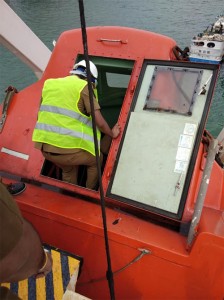News
To cope with higher maritime traffic, Sri Lanka Customs launches Vessel Rummaging Team
View(s):The Sri Lanka Customs last week commissioned a newly-trained Vessel Rummaging Team with assistance from the United Nations Office on Drugs and Crime (UNODC) and in partnership with the UK Border Force.

Sri Lanka Customs' Vessel Rummaging Team at work
The Customs had not fielded a dedicated Vessel Rummaging Team since the early 1990s due to the closure of their Marine Branch (the seagoing enforcement arm).
The 10-member team is headed by Mr Buddhadasa, Director of the preventive directorate. The training was conducted by two trainers from the Commercial Vessel Rummaging Team from the UK Border Force based in Liverpool.
Vessel rummaging refers to the search of a commercial vessel when it enters the jurisdiction of a coastal state. Commercial vessels can be used to transport illicit contraband across borders either with or without the complicity of its master and crew.
Further, it is important to ensure that vessels plying Sri Lankan waters have their documentation in order, which a Vessel Rummaging Team can check. Under international law, commercial vessels need to maintain a number of up-to-date licences, insurances and certificates, Mr Buddhadasa pointed out. “It is important that documentation is in order,” he explained. “These documents enable us to authenticate the cargo, last port of call, details of crew, passengers and the stock of controlled items or weapons carried on board the vessel. Foreign liquor, cigarettes, high-value consumer items such as electronics are frequently smuggled via sea routes, costing the government revenue.”
Sri Lanka’s Customs Ordinance empowers customs officers to board and search vessels in port and within the 12-nautical mile territorial waters of Sri Lanka. “We make a threat assessment to prioritise which vessels we rummage; there are tell-tale signs we look for to classify which vessels are deemed high-risk of trafficking or hiding contraband,” he said. “There are also other vessels, like fishing vessels, tug boats, yachts and pleasure craft that frequent Sri Lankan waters and ports which can be used for smuggling.”
According to Mr Buddhadasa, the Customs has a long history of vessel rummaging and anti-smuggling operations at sea. The Customs Marine Branch, established in 1956 had functioned till 1989 with 85 officers, divers and boat crew. In 1991, the fleet of 17 Customs launches were taken over for military duties as the war reached the maritime domain, effectively shutting down the Marine Branch.

The newly minted team search a life boat
“We are at an initial stage; more resources, specialised equipment, training and coordination between stakeholders is needed,” a Vessel Rummaging Team member, who wished not to be named, said. “We need specialised equipment to board and search a range of commercial vessels,” he said, pointing out that this was a high-risk task. “Deep inside a vessel’s hull, there are fumes that may escape from hazardous cargo such as petroleum products and chemicals. If we are not careful, we run the risk of serious harm or death,” he explained. Once aboard vessels, specialised safety gear is needed to check air quality, the presence of petroleum or chemical vapours, acids and other corrosive cargo.
Given Sri Lanka’s push to become a maritime transshipment hub, invariably the increased traffic will bring with it an increase in maritime crime.
“An increase in vessel traffic in the region can have a corresponding effect on the movement of illicit cargo, both in terms of trafficking on small craft and commercial vessels,” said Shanaka Jayasekara of the UNODC’s Maritime Crime Programme (MCP). “The training in vessel rummaging involves safety aspects in vessel searching, identifying concealed compartments, cavities and confined spaces, and most importantly common methods used for concealment,” explained Mr Jayasekara. He added that specialised training was needed for different types of vessels such as container carriers, bulk carriers and oil tankers.
Given the increase in vessel passage and trafficking around Sri Lanka, the Customs needed to expand their reach, capabilities and capacity, Mr Buddhadasa stressed. “There is a strong need for patrol vessels,” he said. Mr Jayasekara added that Sri Lanka needed to strengthen its overall maritime operational capability to effectively enforce its jurisdiction within its territorial waters. He explained that there was a need for a well-thought out maritime strategy which defined the roles and responsibilities of the respective agencies. “Within Sri Lanka’s territorial sea, the Navy, Coast Guard, Police Marine Unit, Police Narcotics Bureau, Customs, Fisheries Department, Marine Pollution Authority, Merchant Shipping Secretariat, and the Maritime Rescue Coordination Centre (MRCC) all have different roles which are important,” he said. Given Sri Lanka’s ambition to become a key maritime player in the Indian Ocean region, the importance of a well-formulated maritime strategy to coordinate maritime law enforcement efforts is essential.

